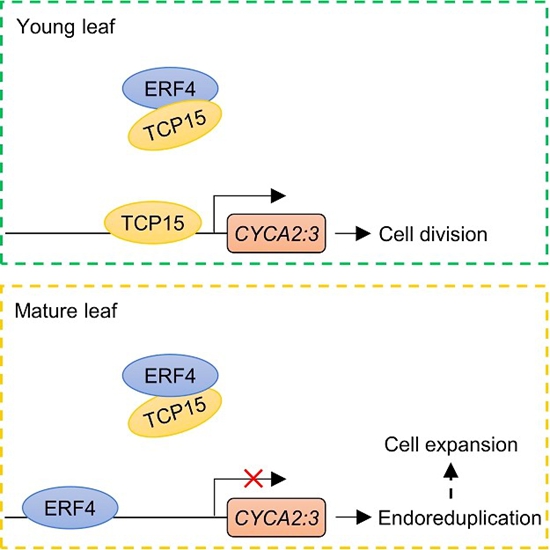An ERF4-TCP15 Module in Regulating Cell Cycle Progression and Leaf Development Revealed
Recently, the Innovation Team of Functional Genomics from Tobacco Research Institute of Chinese Academy of Agricultural Sciences (TRI-CAAS) demonstrated an ERF4-TCP15 transcriptional complex who antagonize each other in regulating cell cycle progression during leaf development in Arabidopsis, using molecular and genetic methods. On June 30th, the main findings were published online in the prestigious journal Journal of Integrative Plant Biology (JIPB).
Mitotic cell cycle is the basis of cell division and proliferation, while the differentiation and expansion of organs often depend on the transformation of cells from mitotic cycle to endoreduplication cell cycle. Precise regulation of cell cycle is the key step to achieve normal growth and development and endow plants the ability to effectively deal with environmental stresses. However, at present, the transcriptional regulatory network underlying plant cell cycle progression is not clear.
This study found that ERF4 transcription factor inhibits the expression of a key cyclin gene cyca2; 3, promotes nuclear replication, hence positively regulating cell enlargement and leaf expansion. It also interacts with TCP15, an important activator of mitotic cell cycle. In Arabidopsis, TCP15 activates the expression of cyca2;3 to promote cells entering into the mitotic cycle; while as a transcriptional repressor, ERF4 inhibits the expression of cyca2;3 to positively regulate endoreduplication. Interestingly, during leaf development, TCP15 is highly expressed in young leaves, promoting cell mitosis and proliferation; whereas ERF4 is highly expressed in mature leaves, promoting intranuclear replication and cell expansion. Therefore, this study revealed that an ERF4-TCP15 module accurately regulates cell cycle progression and leaf development through spatio-temporal expression regulation and protein physical interaction.
Associate Professor Ding Anming is the first author and corresponding author of the paper, and Associate Professor Yan Ning is the co-corresponding author. This study was funded by the National Natural Science Foundation of China, the Agricultural Science and Technology Innovation Program, the Key Science and Technology Projects of Sichuan Tobacco Research Institute and the Central Public-Interest Scientific Institution Basal Research Fund.

Molecular Mechanism of an ERF4-TCP15 Module in Regulating Cell Cycle Progression
Original link:
https://onlinelibrary.wiley.com/doi/epdf/10.1111/jipb.13323
By Ding Anming (dinganming@caas.cn)
-
 Apr 18, 2024Opening Ceremony of the Training Workshop on Wheat Head Scab Resistance Breeding and Pest Control in Africa Held in CAAS
Apr 18, 2024Opening Ceremony of the Training Workshop on Wheat Head Scab Resistance Breeding and Pest Control in Africa Held in CAAS -
 Apr 03, 2024IPPCAAS Co-organized the Training Workshop on Management and Application of Biopesticides in Nepal
Apr 03, 2024IPPCAAS Co-organized the Training Workshop on Management and Application of Biopesticides in Nepal -
 Mar 28, 2024Delegation from the School of Agriculture and Food Science of University College Dublin, Ireland Visit to IAS, CAAS
Mar 28, 2024Delegation from the School of Agriculture and Food Science of University College Dublin, Ireland Visit to IAS, CAAS -
 Mar 25, 2024Director of World Food Prize Foundation visited GSCAAS
Mar 25, 2024Director of World Food Prize Foundation visited GSCAAS -
 Mar 20, 2024Institute of Crop Sciences (ICS) and Syngenta Group Global Seeds Advance Collaborative Research in the Seed Industry
Mar 20, 2024Institute of Crop Sciences (ICS) and Syngenta Group Global Seeds Advance Collaborative Research in the Seed Industry
